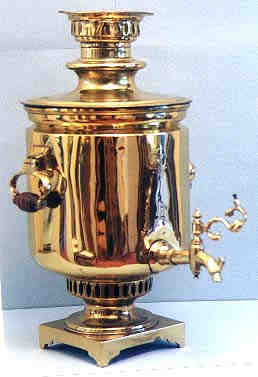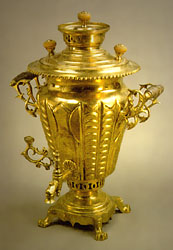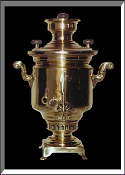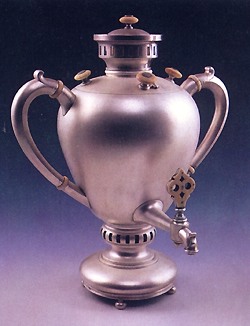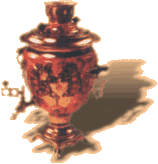|
Kharms, Daniil Real name, Daniil Ivanovich
Iuvachev. Born 17 (30) December 1905 in Petersburg. His mother
ran a refuge for women who were released from prison. His father
was a former member of the People's Will (Narodnaya Volya)
revolutionary organization. He was arrested in 1883 and spent time
in Schiesselburg Fortress and in Sakhalin in far eastern Siberia.
In prison, he became religious and a pacifist. After his release,
he returned to Petersburg and took up writing. His works include
"Eight Years in Sakhalin" (under the pseudonym of I.P. Miroliubov)
in 1901 and "Schiesselburg Fortress" in 1907.
In 1915, the young Daniil was sent to a very disciplined German
school on the Nevsky Prospect. There he learned German and
English. His notebooks contain hand-written copies of the poems of
Lewis Carroll in English. In 1919, he went to live with his aunt
in Detskoe Selo. Begins to write verse in approximately
1922.
In 1924 he moves back to Leningrad and enters the Leningrad
ElektroTeknicum. In 1925, he began to perform in public as a
poetry reader of his own works as well as the works of other Soviet
poets, including Mayakovsky, Severyanin, and Aseeva. He attended
literary evenings and became friends with V. Vvedensky. He also
started an acquaintance with the poets N. Kliuev and A. Tyfanov.
It is in this year that he first used his most popular pseudonym--
Daniil Kharms. He had over 30 pseudonyms in total.
In early twenties, he was associated with the poetry movement known
as "Zaum" ("Trans-sense", "Trans-rational", or "Unintelligible").
On 17 October 1925, just eight days after being officially accepted
into the Leningrad department of the All-Russian Union of Poets,
Kharms performed at a Zaum literary evening, along with Vvedensky
and Tufanov. In January 1926, Kharms and Vvedensky formed a branch
of Zaum, calling themselves "Plane Trees". Kharms's first
published work "Incident on the Railroad" appears in 1926 in the
almanac "Poetry Collection", prepared by the Leningrad department
of the Union of Poets.
In 1927, Kharms proposed the creation of an Academy of Left
Classics, whose purpose would be a "struggle against hacks". On 28
March, the "Plane Trees" hold a literary evening which erupts in
catcalls, whistles, and fights in the audience.
At the end of 1927 the Plane Trees announced the formation of a new
group: OBERIU (an abbreviation for the "Union of Real Art-oo").
In its manifesto, the OBERIU said its main task was to portray the
world in a clearly objectified manner.
In a letter to a friend, Kharms wrote, "When I write poetry, the
most important thing for me is not the idea, not the contents and
not the form and not the obscure notion of "quality", but something
even more obscure and unintelligible to the rational mind, but
understandable to me...This is--purity of order. This purity is
the same in the sun, in the grass, in man, and in poetry. Real art
stands side by side with the first reality. It creates the world
and is its first reflection."
On 28 January 1928, OBERIU hosts a theatrical evening called "Three
Left Hours". The first hour was for poetry readings. During this,
Kharms rode out onto stage on a black lacquered wardrobe, which was
animated by two men hiding inside. Kharms, on the top, was covered
in white powder and wearing a long jacket decorated with red
triangles. On his head was a golden cap with pendants. In a loud,
somewhat raspy voice, he declaimed some "phonetic poems".
The second hour of the meeting was given over to a performance of
Kharms' play "Elizaveta Bam". The heroine of the play is an
adolescent. "From the beginning to the end of the play, the girl
is chased by two dark persons. They accuse Bam of a murder she did
not commit. The girl tries to joke her way out of it, run away, to
plead with and to amuse her pursuers. For a while, this works.
And then the tense expectation of something horrible is shattered
by a clownish joke. The persecutors accept Elizaveta's invitation
to a game. The accused victim and the accusers play a kind of
broken telephone and cat-and-mouse game. But despite the fun and
games, the persecutors' purpose does not change. The play ends
with them taking away Bam. The series of playful episodes in the
play are perceived as independent episodes. Bam's persecutors,
Ivan Ivanovich and Pyotr Nikolaiovich, forgetting about their evil
mission, play the fool. Mama and Papa Bam play up to them.
Besides isolated staged episodes, the play unrolls an interlude in
verse "Battle of Two Bogatyrs"; the connection of this to the main
action is hard to fathom. Thus the play reveals two forces. One
is trying to construct a subject and lead it to a conclusion. The
other force tries to break the dramatic line of the subject, to
shatter it. It bursts out into circus, farce, buffoonery, self-
sufficient theatrical scenes. The first force brings out a
disturbing theme; the second one, a festive, disruptive one. Both
forces fight with shifting success. But in the end, despite the
dark beginning and conclusion, what remains in the memory is the
eccentric game, the unfettered romp." (Aleksandrov, Anatoly.
"Chudodei: Lichnost' i Tvorchestvo Daniila Kharmsa". Sovetskii
Pisatel'. 1991)
In 1928, Kharms also began working for the children's magazine
"Yozh" ("Hedgehog"), edited by Marshak. By the end of the year,
"Yozh" had printed ten of Kharms's works, including the poem "Ivan
Ivanovich Samovar."
In 1930 he also began writing for the children's magazine "Chizh"
("Siskin"). Konstantin Chukovsky recalled, "Now it's almost
unbelievable that the witty verses of Kharms, to which children
(especially young children) were so attracted, in the 1930s drew
furious rage from the majority of pedagogues."
The occasional OBERIU theatrical "concerts" continued into 1930.
Then on 9 April 1930 an article characterizing one of their
performances appeared in the journal "Smena". The article, by L.
Nilvich, was entitled "Reactionary Juggling: Concerning an Attack
by Literary Hooligans". Following this, OBERIU performances
ceased.
In December of 1931, based on a false denunciation, the editorial
staff at "Yozh", including Kharms, were temporarily arrested. He
was released on 18 June 1932. Kharms resumed his work for "Chizh",
producing, among other things, a cycle of stories about Professor
Trubochkin. He also created the character "Smart Masha", who was
a continuing feature in the magazine.
In 1934 he also began work on a philosophical-literary piece
entitled "Existence". Although never finished, he signed the
manuscript "Daniil Dandan". This year also saw him accepted into
the newly formed Union of Soviet Writers. And he married Marina
Vladimirovna Malich.
As numerous of Kharms's friends and colleagues fell into official
disfavor (Zabolotsky) or were arrested (Oleinikov), Kharms's own
literary reputation was cast into doubt. In 1937, he was
temporarily banned from the pages of "Chizh", reappearing only a
year later. In 1937 and 1938, he hosted musical-literary evenings
in his apartment. One participant remembers a noticed posted on
the walls which read: "List of Persons Particularly Respected in
This House". The list included the names Bach, Gogol, Glinka, and
Knut Hamsun. In 1939, Kharms finished his "Incidents" cycle, which
includes "Pushkin and Gogol". An article that year in the magazine
"Children's Literature" entitled "Comic Poetry" gives a favorable
review of Kharms's work.
On 23 August 1941, he was arrested. The doorman asked him to come
down into the courtyard for something. He was taken away half-
dressed, wearing slippers on his bare feet. He died on 2 February
1942 in a prison hospital in Novosibirsk. He was rehabilitated in
1956.
|




